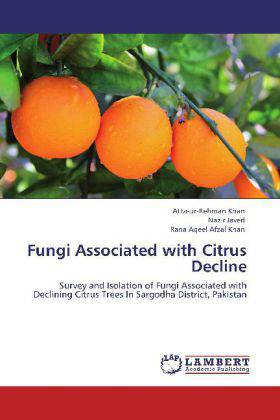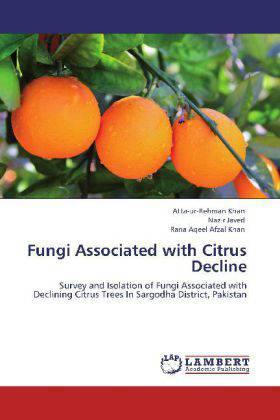
- Afhalen na 1 uur in een winkel met voorraad
- Gratis thuislevering in België vanaf € 30
- Ruim aanbod met 7 miljoen producten
- Afhalen na 1 uur in een winkel met voorraad
- Gratis thuislevering in België vanaf € 30
- Ruim aanbod met 7 miljoen producten
Zoeken
Fungi Associated with Citrus Decline
Survey and Isolation of Fungi Associated with Declining Citrus Trees In Sargodha District, Pakistan
Atta-ur-Rehman Khan, Nazir Javed, Rana Aqeel Afzal Khan
Paperback | Engels
€ 64,45
+ 128 punten
Omschrijving
A thorough survey of four tehsils of Sargodha District was carried out to investigate the present status of citrus decline in citrus orchards. The maximum fungi (39.52 %) were isolated from the roots followed by the soil (38.86%). The maximum Fusarium spp followed by Aspergillus and Alternaria were isolated from the collected samples of roots and soil from the four tehsils of Sargodha District. The maximum Fusarium spp was isolated from the roots of declining citrus trees from the tehsil Bhalwal (68.57%) followed by the Kot Momin (65.87%), Sillanwali (55.87%) and Sargodha (50.32%). F. solani gave the maximum mycelial growth on the Corn Meal Dextrose Agar medium followed by the Potato Dextrose Agar medium and then Malt Extract Agar medium. The maximum growth of F. solani was observed at pH 6 followed by 5, 4 and 7. While minimum growth was obtained at 3, 8 and 9 pH respectively Toxin studies were also carried out using thin layer chromatography which revealed that F. Solani produces toxins (anhydrofusarubin) which may cause decline in citrus.
Specificaties
Betrokkenen
- Auteur(s):
- Uitgeverij:
Inhoud
- Aantal bladzijden:
- 96
- Taal:
- Engels
Eigenschappen
- Productcode (EAN):
- 9783848402090
- Verschijningsdatum:
- 8/03/2012
- Uitvoering:
- Paperback
- Afmetingen:
- 152 mm x 220 mm
- Gewicht:
- 150 g

Alleen bij Standaard Boekhandel
+ 128 punten op je klantenkaart van Standaard Boekhandel
Beoordelingen
We publiceren alleen reviews die voldoen aan de voorwaarden voor reviews. Bekijk onze voorwaarden voor reviews.








